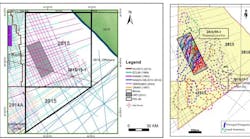North Dakota has approved new rail transportation safety standards for crude oil that stipulate operating standards for oil-conditioning equipment at the well to separate production fluids into gas and liquid.
The North Dakota Industrial Commission voted unanimously Dec. 9 on standards requiring producers to heat crude to at least 110° F. at 50 psi of pressure, effective Apr. 1.
The new standards, which apply to crude oil from the Bakken, Three Forks, and Sanish formations, require the removal of light hydrocarbons ensuring crude oil going to rail terminals has a rvp limit of 13.7 psi.
The new standards involve lower temperatures than the NDIC initially considered and some of the operating procedures also were changed from original proposals (OGJ Online, Nov. 14, 2014).
"This is all designed so that everyone knows the crude oil is being treated," said Lynn Helms, North Dakota mineral resources director. Helms told reporters in Bismarck, ND, that he does not yet have an estimate for how much it might cost producers to comply with the standards. Costs will vary widely depending on each producer's field setup, he said.
Helms said he sent inspectors to 300 heater-treaters throughout the state recently, finding 55% already operated within the new guidelines. About 33% were operating at lower temperatures than the new standards while 12% applied no heat at all to crude oil.
"Those 12% were predominantly smaller producers who were cutting costs, and they will be affected greatly by the new standards," Helms said.
The North Dakota Petroleum Council Pres. Ron Ness declined immediate comment Dec. 10, telling OGJ that he was still in the process of reviewing the standards.
Industry previously has questioned proposed vapor pressure standards, saying crude oil was being unfairly singled out. Some have said the new standards could slow production and increase costs.
Hess Corp., Whiting Petroleum Corp., and Continental Resources Inc. were among oil companies that submitted comments to the NDIC during the rulemaking process.
Helms said, "We're confident that the revised numbers not only protect the gathering system pipelines, but achieves our 13.7 psi goal."
